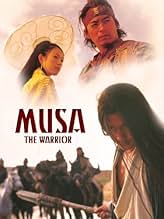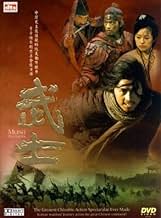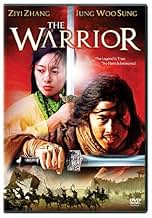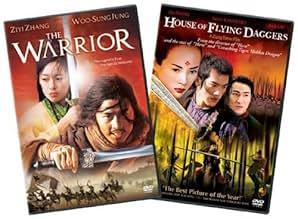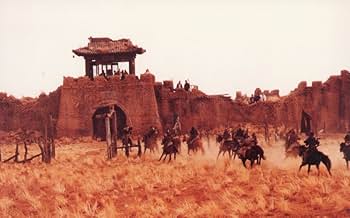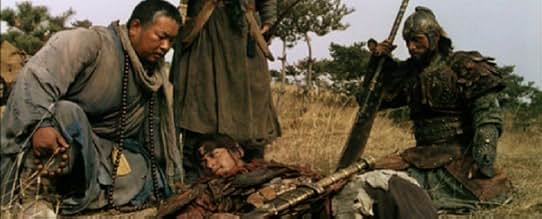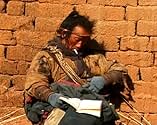VALUTAZIONE IMDb
7,1/10
11.434
LA TUA VALUTAZIONE
Aggiungi una trama nella tua lingua1375. Nine Koryo warriors, envoys exiled by Imperial China, battle to protect a Chinese Ming Princess from Mongolian troops.1375. Nine Koryo warriors, envoys exiled by Imperial China, battle to protect a Chinese Ming Princess from Mongolian troops.1375. Nine Koryo warriors, envoys exiled by Imperial China, battle to protect a Chinese Ming Princess from Mongolian troops.
- Regia
- Sceneggiatura
- Star
- Premi
- 6 vittorie e 11 candidature totali
Ziyi Zhang
- Princess Bu-yong
- (as Zhang Ziyi)
Park Jeong-hak
- Ga-nam
- (as Park Jung-hak)
Jeong Mi-nam
- Yongho Soldier
- (as Mi-Nam Jung)
Recensioni in evidenza
Emissaries from Korea stumble across an attempt by Mongol warriors to kidnap a Chinese princess. Nice clean and simple premise for a Summer blockbuster, one whose marketing (and casting) coasts on the popularity of Crouching Tiger and Hero but whose execution is very different.
I saw this one by accident thinking it was Hero, the massive 2002 Oscar nominee also starring Zhang Ziyi (and, for all its dodgy ideology, worth discovering for the visual feast alone). The region 2 (Korean & French audio 5.1) looked good so I rented it... Back when that was still a thing.
First, this is not Hero, nor is it a wuxia or wire-work driven martial arts film. This is a Historical action film, and despite the prowesses of its heroes, Musa's violence is realistic and brutal. It is a very clever men-on-a-mission flick, with interesting balance and variety within the team, with echoes of Seven Samurai. Where things take an even more pleasant turn are in the interesting portrayal of our characters: a borderline unlikable "hero" (or so he seems at first) and princess, great nobility in the lower ranks, and a surprisingly likable and charismatic villain, if indeed you can call him that.
In production value terms, this can compete with anything Hollywood churns out, and the technical credits, from editing to earthy cinematography, are all excellent. Fast-shutter action, made popular by Saving Private Ryan and Gladiator, is put to brutal use here, and there is a fine balance of chaotic individual moments and interesting strategies, something that would later be explored in John Woo's Red Cliff. This film procures that very rare delight of watching a film and knowing exactly where all the money, effort and care went, because it is all up there on screen, and for once, equally distributed, performances included. Something you have got to see.
For your consideration, ladies and gentlemen: Musa.
I saw this one by accident thinking it was Hero, the massive 2002 Oscar nominee also starring Zhang Ziyi (and, for all its dodgy ideology, worth discovering for the visual feast alone). The region 2 (Korean & French audio 5.1) looked good so I rented it... Back when that was still a thing.
First, this is not Hero, nor is it a wuxia or wire-work driven martial arts film. This is a Historical action film, and despite the prowesses of its heroes, Musa's violence is realistic and brutal. It is a very clever men-on-a-mission flick, with interesting balance and variety within the team, with echoes of Seven Samurai. Where things take an even more pleasant turn are in the interesting portrayal of our characters: a borderline unlikable "hero" (or so he seems at first) and princess, great nobility in the lower ranks, and a surprisingly likable and charismatic villain, if indeed you can call him that.
In production value terms, this can compete with anything Hollywood churns out, and the technical credits, from editing to earthy cinematography, are all excellent. Fast-shutter action, made popular by Saving Private Ryan and Gladiator, is put to brutal use here, and there is a fine balance of chaotic individual moments and interesting strategies, something that would later be explored in John Woo's Red Cliff. This film procures that very rare delight of watching a film and knowing exactly where all the money, effort and care went, because it is all up there on screen, and for once, equally distributed, performances included. Something you have got to see.
For your consideration, ladies and gentlemen: Musa.
Musa the Warrior, This Korean epic it's about an brave tale in era of the strongest ... All the elements of this film should be an great entrance's creativeness from the biggest & the greatest gate of the seventh art's , also that gate must be opens & specially for Korean-Cinema only! to given another arts a dose of dramatic realism through this film! actually , the historical exquisite cinematography characteristic has been found in Korea after this film "of course"!!
(( MUSA )) is a great film that combined the same appealing attributes of war and bravery in historical films.
10/10
HOT & GREAT congratulations of us to Korean-Cinema :-)
______(( must see and must own ))______
(( MUSA )) is a great film that combined the same appealing attributes of war and bravery in historical films.
10/10
HOT & GREAT congratulations of us to Korean-Cinema :-)
______(( must see and must own ))______
There is a nothing like a good epic film. Here is a fine entry to the genre from South Korea, a nation that doesn't normally make these sort of films. Film in China and staring the beautiful Zhang Ziyi it had potential.
Set in 1374 relations between Korea and the Ming Dynasty in China are at a low. The Koreans send a diplomatic mission to resort their relationship, led by General Choi-Jung (Joo Jin-mo). However when arriving in a city he team are captured and exiled from China. Left for dead in the desert their run into a Mongol army party which have captured Princess Bu-yong (Zhang Ziyi). The Korean party save her and hope to return her to Emperor, saving their mission. Within the party is Yeosol (Jung Woo-sung), a recently freed slave who was loyal to his master and excellent fighter with a spear. He and the Princess have an attraction to each other. After freeing the Princess, the Mongols are upset. There were hoping to use her as a bargaining chip against the Ming's China. They chase the Koreans and destroy countryside villages to get her back.
The story and plot are simply and believable within the context of the film; always good signs. Within the group many of characters and relationships are developed, especially Yeosol, the General, the Princess and Jinlip, the veteran of the group. Even the main bad guy has some nobility about him. The costumes and weaponry are excellently done. The warfare was brutal and shows woman and children getting killed, something that rarely happens in Hollywood films. The film is deliciously violence. My only real problem with the film, which lets it down is the action. It is good that the action is violence, but it is so overly edited and the shaky-cam make it difficult to follow. If the action was better then the would have been even better.
If you enjoy films like the Lord of the Rings trilogy, Gladiator, Conan the Barbarian and Red Cliff, you will like this film.
Set in 1374 relations between Korea and the Ming Dynasty in China are at a low. The Koreans send a diplomatic mission to resort their relationship, led by General Choi-Jung (Joo Jin-mo). However when arriving in a city he team are captured and exiled from China. Left for dead in the desert their run into a Mongol army party which have captured Princess Bu-yong (Zhang Ziyi). The Korean party save her and hope to return her to Emperor, saving their mission. Within the party is Yeosol (Jung Woo-sung), a recently freed slave who was loyal to his master and excellent fighter with a spear. He and the Princess have an attraction to each other. After freeing the Princess, the Mongols are upset. There were hoping to use her as a bargaining chip against the Ming's China. They chase the Koreans and destroy countryside villages to get her back.
The story and plot are simply and believable within the context of the film; always good signs. Within the group many of characters and relationships are developed, especially Yeosol, the General, the Princess and Jinlip, the veteran of the group. Even the main bad guy has some nobility about him. The costumes and weaponry are excellently done. The warfare was brutal and shows woman and children getting killed, something that rarely happens in Hollywood films. The film is deliciously violence. My only real problem with the film, which lets it down is the action. It is good that the action is violence, but it is so overly edited and the shaky-cam make it difficult to follow. If the action was better then the would have been even better.
If you enjoy films like the Lord of the Rings trilogy, Gladiator, Conan the Barbarian and Red Cliff, you will like this film.
I'd never heard of this movie until my buddy Eric rented it; that Blockbuster carries it is I guess a good sign. Part Crouching Tiger, part Saving Private Ryan, with just a smidgen of Hidden Fortress and an echo of Xenophon, Musa is a highly enjoyable movie.
The movie begins in 1375 with a failed delegation from Korea to the Ming dynasty. Led by General Choi Jung (Jin-mo Ju), the delegation become prisoners of the Ming, being led off to exile, when the Mongols strike. Suddenly finding themselves free, the delegation decides to rescue the captive Ming princess (Ziyi Zhang, of Crouching Tiger fame) who travels with the Mongols. When they succeed, naturally, the Mongols want her back, and thus begins an arduous trek across the desert, culminating in a Road Warrior-esque fight at a battered old castle where the survivors hole up against their much more mobile but less-civilized attackers.
Musa has action in spades, some of it exceptionally grisly (every archery attack is cause for dozens of shots of gruesome impalings). The battles are tense and tautly filmed and feel more dangerous than most combats of this type. We eschew the beautiful martial arts style so prevalent in many Hong Kong films for a grittier and far more realistic, if a bit bloody, style here. But what Musa also possesses is atmosphere; the locations and the cinematography are top-notch, from the boundless deserts to the broken-down castle by the sea. Musa does an excellent job of selling the world it is set in.
The costumes help with this as well. Not since Brotherhood of the Wolf have I seen such elaborate and effective costuming (the armor and such here was even more intricate and character-intensive than Last Samurai, which is saying something). Each character has his own particular look, is easily told apart from the others, and costuming is ultimately an extension of character, which to me has always been the whole point. These are some of the best period costumes you'll see anywhere.
The acting is all pretty good, though it tends to come from the George Lucas school of `faster, more intense.' One facet I did like is that no one is perfect; the general is a bit of a jerk; his loyal retainer Ga-nam (Jeong-Hak Park), while a mighty warrior, lacks the ability to really think for himself; the princess is spoiled; the slave-turned-warrior Yeo-sol (Woo-sung Jung) is selfless but headstrong, and so on. Even the Mongols come across as human, if a bit savage (which, having done the research, I can attest is more or less pretty accurate).
Musa isn't for everyone due to the violence. But it's a very well done period piece with wonderful visuals that certainly captivates the viewer. It's as good or better than any of the historical epics Hollywood has released in the past few years (with the exception of The Last Samurai), and from a costuming and cinematography sense is very much worth your while to see. Just don't bother tracking this down if you're a little squeamish, that's all.
The movie begins in 1375 with a failed delegation from Korea to the Ming dynasty. Led by General Choi Jung (Jin-mo Ju), the delegation become prisoners of the Ming, being led off to exile, when the Mongols strike. Suddenly finding themselves free, the delegation decides to rescue the captive Ming princess (Ziyi Zhang, of Crouching Tiger fame) who travels with the Mongols. When they succeed, naturally, the Mongols want her back, and thus begins an arduous trek across the desert, culminating in a Road Warrior-esque fight at a battered old castle where the survivors hole up against their much more mobile but less-civilized attackers.
Musa has action in spades, some of it exceptionally grisly (every archery attack is cause for dozens of shots of gruesome impalings). The battles are tense and tautly filmed and feel more dangerous than most combats of this type. We eschew the beautiful martial arts style so prevalent in many Hong Kong films for a grittier and far more realistic, if a bit bloody, style here. But what Musa also possesses is atmosphere; the locations and the cinematography are top-notch, from the boundless deserts to the broken-down castle by the sea. Musa does an excellent job of selling the world it is set in.
The costumes help with this as well. Not since Brotherhood of the Wolf have I seen such elaborate and effective costuming (the armor and such here was even more intricate and character-intensive than Last Samurai, which is saying something). Each character has his own particular look, is easily told apart from the others, and costuming is ultimately an extension of character, which to me has always been the whole point. These are some of the best period costumes you'll see anywhere.
The acting is all pretty good, though it tends to come from the George Lucas school of `faster, more intense.' One facet I did like is that no one is perfect; the general is a bit of a jerk; his loyal retainer Ga-nam (Jeong-Hak Park), while a mighty warrior, lacks the ability to really think for himself; the princess is spoiled; the slave-turned-warrior Yeo-sol (Woo-sung Jung) is selfless but headstrong, and so on. Even the Mongols come across as human, if a bit savage (which, having done the research, I can attest is more or less pretty accurate).
Musa isn't for everyone due to the violence. But it's a very well done period piece with wonderful visuals that certainly captivates the viewer. It's as good or better than any of the historical epics Hollywood has released in the past few years (with the exception of The Last Samurai), and from a costuming and cinematography sense is very much worth your while to see. Just don't bother tracking this down if you're a little squeamish, that's all.
Someone insulted the Korean movie industry by stating this is one of Korea's best films. I must be honest, I couldn't get myself to see the entire movie, which is a rarity for me. By the time I decided to stop torturing myself the following had occurred in the movie.
1)The tempermental and rebellious "hero" who has a serious self control problem gets the entire ancient Korean Caravan in trouble with his psychotic propensity towards violence. The Caravan saves themselves and the hero with cunning and wit. 2)The "hero" puts the entire Caravan in jeopardy again by cutting off the head of one of the merchants. This time many Caravan members die but they still escape relatively intact. 3)The Caravan finds a way to escape from their dire situation but the "hero" puts an end to their salvation by doing something totally stupid and irrational. Again, the great leadership, solidarity, and fighting ability of the Caravan saves them from disaster.
By this time, I began to beg someone to have the senses to kill the "hero" who was getting everyone else killed with his irresponsible actions. Instead of languishing in frustration, I decided to use my remote control.
The "hero" is played by Jung Woo Sung, one of the worst, and yet one of the most popular, actors in Korea. The only characters he usually plays are the silent rebellious types who act angry all the time, probably to hide his lack of acting ability.
This was the most expensive movie made in Korea (few films have surpassed it since). Yet it was a box office bomb, and with a good reason.
1)The tempermental and rebellious "hero" who has a serious self control problem gets the entire ancient Korean Caravan in trouble with his psychotic propensity towards violence. The Caravan saves themselves and the hero with cunning and wit. 2)The "hero" puts the entire Caravan in jeopardy again by cutting off the head of one of the merchants. This time many Caravan members die but they still escape relatively intact. 3)The Caravan finds a way to escape from their dire situation but the "hero" puts an end to their salvation by doing something totally stupid and irrational. Again, the great leadership, solidarity, and fighting ability of the Caravan saves them from disaster.
By this time, I began to beg someone to have the senses to kill the "hero" who was getting everyone else killed with his irresponsible actions. Instead of languishing in frustration, I decided to use my remote control.
The "hero" is played by Jung Woo Sung, one of the worst, and yet one of the most popular, actors in Korea. The only characters he usually plays are the silent rebellious types who act angry all the time, probably to hide his lack of acting ability.
This was the most expensive movie made in Korea (few films have surpassed it since). Yet it was a box office bomb, and with a good reason.
Lo sapevi?
- QuizDuring filming in China, Woo-sung Jung got knee-injury while shooting one of his fight scenes and had to stay behind after the Korean crew came back to Korea.
- Citazioni
Princess Bu-yong: You could have killed me! I am a Princess!
Yeo-sol: Stop yelling at me! Don't think you can do anything you like just because you are a Princess!
Princess Bu-yong: Unhand me!
[English translation subtitles from Mandarin Chinese in Korean language film]
- Versioni alternativeInternational version runs ca. 25 minutes shorter.
- ConnessioniReferenced in La memoria del cuore (2012)
I più visti
Accedi per valutare e creare un elenco di titoli salvati per ottenere consigli personalizzati
Dettagli
Botteghino
- Budget
- 8.000.000 BND (previsto)
- Lordo in tutto il mondo
- 945.922 USD
- Tempo di esecuzione
- 2h 38min(158 min)
- Colore
- Mix di suoni
- Proporzioni
- 2.35 : 1
Contribuisci a questa pagina
Suggerisci una modifica o aggiungi i contenuti mancanti





